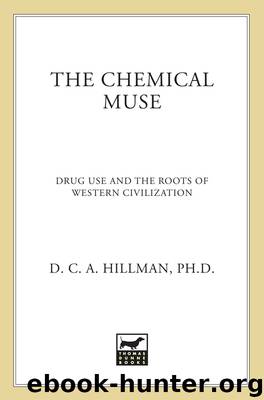The Chemical Muse by D. C.A. Hillman Ph.D

Author:D. C.A. Hillman, Ph.D.
Language: eng
Format: epub
ISBN: 9781466882294
Publisher: St. Martin's Press
6 The Divine Gift of Mind-Bending Intoxication
Those who can not visit the mind’s Antipodes at will (and they are the majority) must find some artificial method of transportation.
—Aldous Huxley
The Muses were Greek goddesses of poetic inspiration. There were nine of them, and their divinity was unassailable; they were the daughters of Zeus himself, the chief Olympian deity, and Mnemosyne, the goddess of memory. Hesiod, an early Greek poet who lived sometime around 700 B.C. and wrote about traditional Hellenic gods, tells us that the entry of the Muses into the world brought a blessed forgetfulness of pain and a rest from sorrow.1 He wrote that the Muses celebrated the ways of immortals and filled musicians and poets with inspiration. Countless artists upheld the ideal of the Muses and began their literary works with dedications to these goddesses of poetic inspiration. By directly invoking the assistance of the Muses, ancient writers acknowledged the seemingly supernatural effects of poetry, music, and art.
All sorts of intellectuals, poets, historians, writers, and philosophers looked to the inspiration of the Muses as a means of giving their work the spark it needed. Each of these nine daughters of Zeus held sway over a particular art. For example, Clio presided over history, Erato over lyric poetry, Melpomene over tragedy, and Calliope over epic poetry. The Classical world trusted that the Muses filled their devotees with some form of celestial grace. They transformed mundane human writings into something divine.
In order to worship the Muses properly—they were goddesses after all—the Greeks created sanctuaries where the arts of writing and music were honored and preserved for the sake of the education and the well-being of the Greek-speaking world. The most famous of these was the great Museum of Alexandria, in Egypt. Here Greek scholars performed groundbreaking research and gave rousing lectures. This scholarly research, performed in honor of the Muses, prepared the Western world to embrace the wisdom of preceding generations and forge ahead with accumulated insight. In this way the cult of the Muses was responsible for the preservation and extension of all our traditional cultural values, customs, and principles. As a home for artistic inspiration and philosophical inquiry, the museum was a forerunner of the modern university.
Hesiod writes that the Muses left their homes on the lofty peaks of Mount Helicon at night to carry their songs of inspiration to mortals.2 This picture seems all too appropriate, when we consider that nighttime and dreaming are closely related concepts in antiquity as they are still today. Classical authors typically softened the crude linguistic distinction between dreams, visions, and divine epiphanies. In fact, much of the mythological narrative found in Greco-Roman literature reflects a keen likeness to the symbolically charged atmosphere of the typical dreamscape; anyone who has read the story of Odysseus and the Cyclops, or Aeneas’s trip to the underworld, cannot help to have noticed the surreal quality of the images and characters found therein. Dreams, visions, and hallucinations were an avenue of discovery for the Greeks—especially when they sought self-knowledge.
Download
This site does not store any files on its server. We only index and link to content provided by other sites. Please contact the content providers to delete copyright contents if any and email us, we'll remove relevant links or contents immediately.
The Vikings: Conquering England, France, and Ireland by Wernick Robert(79854)
Ali Pasha, Lion of Ioannina by Eugenia Russell & Eugenia Russell(40118)
The Conquerors (The Winning of America Series Book 3) by Eckert Allan W(37099)
The Vikings: Discoverers of a New World by Wernick Robert(36905)
Cecilia; Or, Memoirs of an Heiress — Volume 1 by Fanny Burney(32404)
Cecilia; Or, Memoirs of an Heiress — Volume 3 by Fanny Burney(31803)
Cecilia; Or, Memoirs of an Heiress — Volume 2 by Fanny Burney(31775)
Empire of the Sikhs by Patwant Singh(22946)
The Secret History by Donna Tartt(18797)
Hans Sturm: A Soldier's Odyssey on the Eastern Front by Gordon Williamson(18451)
Cat's cradle by Kurt Vonnegut(15138)
Pimp by Iceberg Slim(14292)
Sapiens: A Brief History of Humankind by Yuval Noah Harari(14199)
Talking to Strangers by Malcolm Gladwell(13173)
Norse Mythology by Gaiman Neil(13161)
Leonardo da Vinci by Walter Isaacson(13136)
4 3 2 1: A Novel by Paul Auster(12254)
Underground: A Human History of the Worlds Beneath Our Feet by Will Hunt(11993)
The Radium Girls by Kate Moore(11891)
